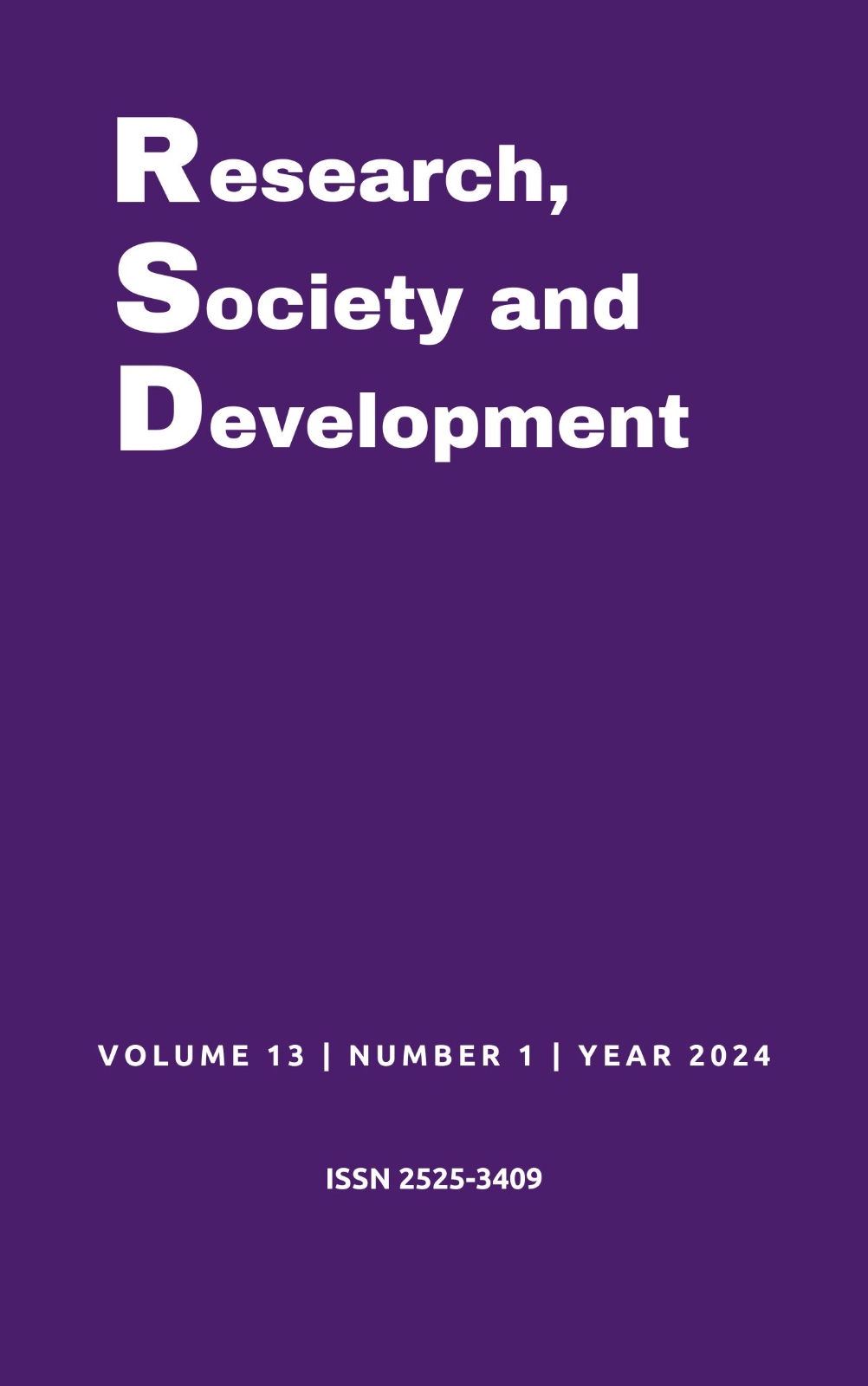Matemática Financiera en la Educación de Jóvenes y Adultos – EJA: Una propuesta didáctica con Enseñanza Híbrida y Aprendizaje Significativo
DOI:
https://doi.org/10.33448/rsd-v13i1.44868Palabras clave:
Matemática financiera, Educación de jóvenes y adultos, Enseñanza híbrida, Aprendizaje significativo.Resumen
Esta investigación propone un enfoque didáctico innovador, integrando las oportunidades que ofrece el modelo de Enseñanza Híbrida con la teoría del Aprendizaje Significativo de David Ausubel. Esta propuesta, basada en la modalidad de aprendizaje teórico-práctico, se sustenta en la perspectiva cognitivista del conocimiento. Dicho esto, el objetivo central de este artículo es explorar cómo una Propuesta Didáctica, basada en la metodología de Enseñanza Híbrida y la Teoría del Aprendizaje Significativo, puede jugar un papel crucial en el proceso de enseñanza y aprendizaje en Matemática Financiera de los estudiantes de la modalidad Educación de Jóvenes y Adultos (EJA). El estudio, de carácter cualitativo, se realizó mediante investigación de campo, realizada en una clase de la EJA de la Escuela Estadual Joaquim Gomes Crespo, ubicada en el municipio de São Francisco do Itabapona, en el Estado de Río de Janeiro. La recolección de datos incluyó cuestionarios, evaluaciones realizadas antes, durante y después de la implementación de la propuesta, además de los propios registros de los estudiantes. Los datos recopilados tuvieron como objetivo explorar el desempeño y las reacciones de los estudiantes en relación con conceptos de Matemática Financiera. Los resultados revelaron consistentemente que la metodología adoptada jugó un papel importante en la mejora y el aprendizaje efectivo en Matemática Financiera de los estudiantes de la EJA. Este hallazgo resalta la efectividad y relevancia de la integración entre Enseñanza Híbrida y Aprendizaje Significativo como un enfoque pedagógico enriquecedor para esta audiencia específica.
Referencias
Ausubel, D. P., Novak, J. D. & Hanesian, H. (1980). Psicologia educacional. (trad. de Eva Nick et al.). Ed. Interamericana.
Bacich, L. & Moran, J. (2018). Metodologias ativas para uma educação inovadora: uma abordagem téorico-prática. Ed. Penso.
Bacich, L., Tanzi Neto, A., & Trevisani, F. de M. (2015). Ensino Híbrido: Personalização e tecnologia na educação. Ed. Penso.
Brasil. (1996). Lei de Diretrizes e Bases da Educação Nacional. Brasília: Ministério da Educação.
Canal Equaciona Matemática. (2016). Recuperado de https://www.youtube.com/channel/UCZLyNRqqp2MeFuwuZdbGDJw
Canal Equaciona Matemática. (2019). Recuperado de https://www.youtube.com/channel/UCZLyNRqqp2MeFuwuZdbGDJw
Gomes, M. M. (2023). A Educação de Jovens e Adultos no Brasil e o contexto social dos alunos dessa modalidade. Revista Educação Pública, 23(17), 1-5. https://educacaopublica.cecierj.edu.br/artigos/23/17/a-educacao-de-jovens-e-adultos-no-brasil-e-o-contexto-social-dos-alunos-dessa-modalidade
Guedes, S. L. P. (2007). O ensino de Matemática pela aprendizagem significativa: Uma experiência de ensino de Matemática Financeira na EJA – Ensino Médio. Cadernos PDE, 1, 1 – 29. http://www.diaadiaeducacao.pr.gov.br/portals/cadernospde/pdebusca/producoes_pde/2007_utfpr_mat_artigo_susana_lucia_ pereira_guedes.pdf.
Horn, M. B., & Staker, H. (2015). Blended: usando a inovação disruptiva para aprimorar a educação. Ed. Penso.
Jogo Tabuleiro das Porcentagens. (2013) Blogspot. Recuperado de https://mgmeturma262grupo1.blogspot.com/2013/06/sugestao-de-jogos-de-porcentagem.html
Lima, B. S. de J. (2013). Matemática e suas tecnologias. Módulo III - Matemática. Ed. Fundação CECIERJ.
Moran, J. & Bacich, L. (2015). Mudando a Educação com Metodologias Ativas. In: Coleção Mídias Contemporâneas. Convergências Midiáticas, Educação e Cidadania: aproximações jovens. Vol. II.
Moreira, M. & Masini, E. (1982). Aprendizagem Significativa: A teoria de David Ausubel. Ed. Moraes.
Moreira, M. A. (1997). Aprendizagem significativa: um conceito subjacente. In: Moreira, M.A., Caballero, M.C. e Rodríguez, M.L. (org.). Actas del encuentro internacional sobre el aprendizaje significativo, 19-44 p.
Moreira, M. A. (2008). Organizadores prévios e aprendizagem significativa. Revista chilena de educación científica, 7, 23-30.
Motta-Roth, D. & Hendges, G. R. (2016). Produção textual na universidade. Revista Linguagem & Ensino, 16(1), 263-277. https://periodicos.ufpel.edu.br/ index.php/rle/article/view/15440/9626
Piaget, J. (2006). Psicologia e pedagogia. Forense Universitária.
Rio de Janeiro. (2015). Manual de Orientações da Nova EJA. Recuperado de http://projetoseeduc.cecierj.edu.br/eja/manual-eja.pdf
Ronca, P. A. C., & do Amaral Terzi, C. (1995). A aula operatória e a construção do conhecimento. Esplan.
Sampaio, C. E. M. & Hizim, L. A. (2022). A educação de jovens e adultos e sua imbricação com o ensino regular. Revista Brasileira de Estudos Pedagógicos, 103(264), 271-298. https://doi.org/10.24109/2176-6681.rbep.103i264.5135
Santos, R.O., Lourenço, E. & Lopes, L.F. (2023). Formação de Professores para EJA no Brasil: Educomunicação na perspectiva freiriana. Revista Debates em Educação, 15(37), 1-21. https://doi.org/10.28998/2175-6600.2023v15n37pe14309
Silva, I. D. D., & Sanada, E. D. R. (2018). Procedimentos metodológicos nas salas de aula do curso de pedagogia: experiências de ensino híbrido. Metodologias ativas para uma educação inovadora: uma abordagem teórico-prática. Penso, 77-90.
Valente, J. A. (2014). Blended learning e as mudanças no ensino superior: a proposta da sala de aula invertida. Educar em revista, 79-97.
Zabala, A. (2015). A prática educativa: como ensinar. Penso Editora.
Descargas
Publicado
Número
Sección
Licencia
Derechos de autor 2024 Edecil de Souza Correa; Nelson Machado Barbosa

Esta obra está bajo una licencia internacional Creative Commons Atribución 4.0.
Los autores que publican en esta revista concuerdan con los siguientes términos:
1) Los autores mantienen los derechos de autor y conceden a la revista el derecho de primera publicación, con el trabajo simultáneamente licenciado bajo la Licencia Creative Commons Attribution que permite el compartir el trabajo con reconocimiento de la autoría y publicación inicial en esta revista.
2) Los autores tienen autorización para asumir contratos adicionales por separado, para distribución no exclusiva de la versión del trabajo publicada en esta revista (por ejemplo, publicar en repositorio institucional o como capítulo de libro), con reconocimiento de autoría y publicación inicial en esta revista.
3) Los autores tienen permiso y son estimulados a publicar y distribuir su trabajo en línea (por ejemplo, en repositorios institucionales o en su página personal) a cualquier punto antes o durante el proceso editorial, ya que esto puede generar cambios productivos, así como aumentar el impacto y la cita del trabajo publicado.


